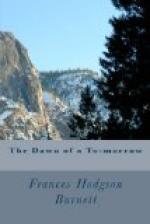The clock struck nine as he did so, consequently he knew the hour. The lodging-house slavey had aroused him by coming to light the fire. She had set her candle on the hearth and done her work as stealthily as possible, but he had been disturbed, though he had made a desperate effort to struggle back into sleep. That was no use—no use. He was awake and he was in the midst of it all again. Without the sense of luxurious comfort he opened his eyes and turned upon his back, throwing out his arms flatly, so that he lay as in the form of a cross, in heavy weariness and anguish. For months he had awakened each morning after such a night and had so lain like a crucified thing.
As he watched the painful flickering of the damp and smoking wood and coal he remembered this and thought that there had been a lifetime of such awakenings, not knowing that the morbidness of a fagged brain blotted out the memory of more normal days and told him fantastic lies which were but a hundredth part truth. He could see only the hundredth part truth, and it assumed proportions so huge that he could see nothing else. In such a state the human brain is an infernal machine and its workings can only be conquered if the mortal thing which lives with it— day and night, night and day—has learned to separate its controllable from its seemingly uncontrollable atoms, and can silence its clamor on its way to madness.
Antony Dart had not learned this thing and the clamor had had its hideous way with him. Physicians would have given a name to his mental and physical condition. He had heard these names often—applied to men the strain of whose lives had been like the strain of his own, and had left them as it had left him—jaded, joyless, breaking things. Some of them had been broken and had died or were dragging out bruised and tormented days in their own homes or in mad-houses. He always shuddered when he heard their names, and rebelled with sick fear against the mere mention of them. They had worked as he had worked, they had been stricken with the delirium of accumulation—accumulation—as he had been. They had been caught in the rush and swirl of the great maelstrom, and had been borne round and round in it, until having grasped every coveted thing tossing upon its circling waters, they themselves had been flung upon the shore with both hands full, the rocks about them strewn with rich possessions, while they lay prostrate and gazed at all life had brought with dull, hopeless, anguished eyes. He knew—if the worst came to the worst—what would be said of him, because he had heard it said of others. “He worked too hard—he worked too hard.” He was sick of hearing it. What was wrong with the world— what was wrong with man, as Man—if work could break him like this? If one believed in Deity, the living creature It breathed into being must be a perfect thing—not one to be wearied, sickened, tortured by the life Its breathing had created. A mere man would disdain to build a thing so poor and incomplete. A mere human engineer who constructed an engine whose workings were perpetually at fault—which went wrong when called upon to do the labor it was made for—who would not scoff at it and cast it aside as a piece of worthless bungling?




